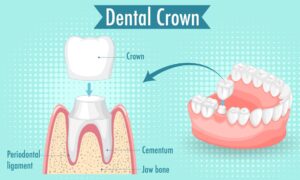Dental Crowns
Enhancing Smile and Functionality
 Dental crowns, also known as caps, are prosthetic devices designed to encase a damaged or weakened tooth, restoring its shape, size, strength, and appearance. Here’s a comprehensive overview of dental crowns:
Dental crowns, also known as caps, are prosthetic devices designed to encase a damaged or weakened tooth, restoring its shape, size, strength, and appearance. Here’s a comprehensive overview of dental crowns:
1. Purpose of Dental Crowns:
- Restoration of Damaged Teeth: Crowns are used to protect and strengthen teeth that have undergone extensive decay, large fillings, or root canal therapy.
- Cosmetic Enhancement: Crowns can improve the appearance of misshapen, discolored, or poorly aligned teeth.
- Support for Dental Bridges: Crowns serve as anchors for dental bridges, replacing missing teeth.
- Protection After Implants: Implants often require crowns to function as the visible, functional part of the new tooth.
2. Types of Dental Crowns:
- Porcelain Crowns: Mimic the natural color and translucency of teeth, making them suitable for front teeth.
- Metal Crowns: Made of alloys like gold or base-metal alloys, these are known for their durability and are often used for back teeth.
- Porcelain-Fused-to-Metal (PFM) Crowns: Combine the strength of metal with the aesthetic appeal of porcelain.
- All-Ceramic or All-Porcelain Crowns: Provide a natural appearance without metal components.
3. Crown Placement Process:
- Diagnosis and Treatment Planning: Assessment of the tooth’s condition and determination of the most suitable type of crown.
- Tooth Preparation: Reshaping the tooth to accommodate the crown.
- Impression: Creating a mold of the prepared tooth for precise crown fabrication.
- Temporary Crown: Placement of a temporary crown while the permanent one is being crafted.
- Crown Installation: Cementing the final crown onto the prepared tooth.
4. Advantages of Dental Crowns:
- Restoration of Tooth Functionality: Crowns restore the strength and functionality of damaged teeth.
- Aesthetic Improvement: Enhance the appearance of teeth by improving shape, color, and alignment.
- Longevity: With proper care, dental crowns can last many years.
- Versatility: Crowns can be used for various dental issues, providing a versatile solution.
5. Aftercare and Maintenance:
- Oral Hygiene: Regular brushing and flossing to maintain oral health.
- Avoiding Excessive Force: While crowns are durable, avoiding habits like teeth grinding or chewing on hard objects is recommended.
6. Considerations for Crown Placement:
- Tooth Strength: Crowns are often recommended for weakened teeth.
- Cosmetic Concerns: For enhancing the appearance of teeth with imperfections.
- Functional Requirements: Providing support for dental bridges or implant restorations.
Dental crowns play a pivotal role in restorative and cosmetic dentistry, offering a reliable solution for preserving and enhancing the health and aesthetics of teeth. If you believe you may benefit from a dental crown, consult with your dentist to explore the most suitable option for your specific needs.
